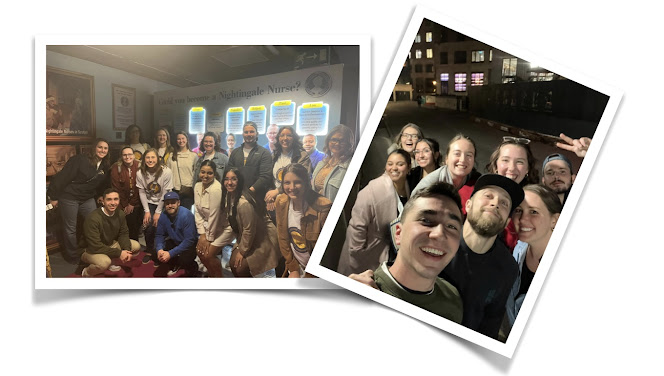This won’t seem like a study abroad post at first, but bear with me. I promise it’ll all come together in the end.
Yesterday was a rich day for the group. But it was an uncharacteristically long day for me, and it ended with me having a sort of unexpected growth (existential?) moment. Apparently, that can still happen in your 40’s. At the end of the day, the group split off into three separate groups. Actually, two groups and then me. I alone went to see the Phantom of the Opera at Her Majesty’s Theatre.

About 10 minutes into the production, it hit me – I have a love-hate relationship with this musical.

I love it for its nostalgia as this was one of the first musicals that I fell in love with and sang from start to finish. I hate it because it is absolutely the dumbest storyline of all time. I also hate it now because I have experienced and performed far superior pieces of music (I was an oboist prior to becoming a nurse).
All this underscores close to three decades of growth since I fell in and out of love with that musical, and none of that would have been possible without certain opportunities afforded to me because of education.
I think a large portion of the students on this trip have started a growth journey similar to that. This day started with another lively discussion about the vast differences (and some similarities) between the education systems of the UK in the US, and how one’s path is essentially chosen at a younger age in the UK than it is in the US leading to a decreased possibility of upward/downward social mobility. Or so we should think.

The second half of the morning’s lecture was dedicated to the path to nursing in the UK versus the path to nursing in the US. We also talked about Advanced Practice Nursing, which looks very different in the US versus the UK. In the UK, “Advanced Practice Nurses” are not truly providers: they do not diagnose diseases/illnesses, nor do they prescribe medications. They are expert nurses, but this does not help Britain achieve what it intended to, which is to add more general practitioners (primary care providers) to the workforce to increase access.

But let’s get back to the students and their journey. We have quite a few first-generation students in this group. Students just like me, who, look for every opportunity to expand their horizons. During and after the lecture there were so many poignant conversations about education, social capital and determinants, and policy and politics (of course!). There are too many to even highlight really.
Those conversations continued at the Florence Nightingale Museum where we had a pretty good time beating Florence at one of her own games (she made forty words – we made forty – TWO!)
I’m happy that the students are increasing their depth of knowledge and relationship to education and healthcare policy, but what is equally important is the intangible product of certain types of educational environments. The students are learning from each other and from the locals that they run into and have conversations with. They are picking up tools to forever have in their cultural toolbox. They are forging and cementing connections with each other – some that will last a lifetime.

And I bet 20 or so years from now, they have similar moments of nostalgic enlightenment that remind them of how far they’ve come. At least I hope so.

